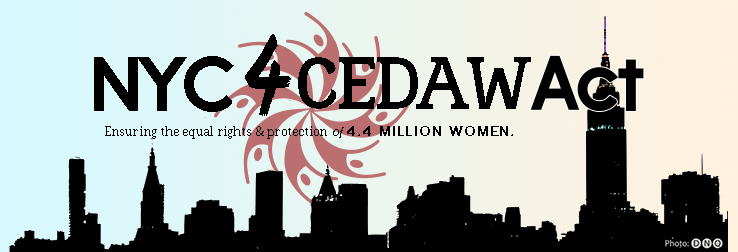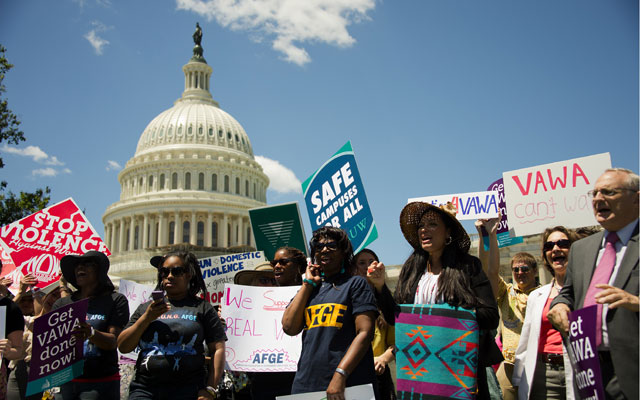Freedom from Violence: a Fundamental Human Right
Permission to repost has been granted by the writers, Joann Kamuf and Erin Foley Smith
Two decades after VAWA’s enactment, violence against women remains a serious problem in the U.S. Domestic violence and sexual assault are two of the most prevalent forms; there are approximately 237,800 sexual assault victims every year, and one in four women will experience domestic violence in her lifetime.
Over the years, some of VAWA’s protections have been watered down, like the ability of survivors to sue individual abusers in federal court—which was rejected by the Supreme Court in 2000. But today there is a renewed federal effort by Vice President Biden to increase accountability. This includes a Vice Presidential Summit bringing together the Department of Justice, legal scholars, and state and local prosecutors to restore the right to sue. However, even if restored, an accountability gap will remain. Indeed, many advocates are pushing for greater accountability for institutions that play a role in perpetuating gender-based violence, including law enforcement agencies, which have engaged in gender-biased policing, including mishandling reported cases of domestic violence and sexual assault, and harboring officers who engaged in acts of gender-based violence.
And ultimately eliminating violence against women requires more than an ability to sue abusers; it requires a comprehensive approach, focused on preventing violence and eradicating its root causes (such as discrimination, social biases, and a lack of adequate institutional responses). This is one of the reasons that advocates and governments alike are looking to human rights principles to address such violence.
In a notable step, President Obama issued a proclamation on the anniversary of VAWA “reaffirm[ing] the basic human right to be free from violence and abuse.” The proclamation echoes initiatives from localities across the country. As of today, twelve jurisdictions have passed local resolutions recognizing freedom from domestic violence and/or violence against women as a fundamental human right, including Albany, Austin, Texas, Baltimore, Boston and Miami-Dade County. Most of these resolutions cite to international human rights law and to the landmark decision of the Inter-American Commission on Human Rights in the case of Jessica Lenahan (Gonzales) v. United States. They further highlight that government has a responsibility to secure the right to be free from domestic violence, and some direct local officials to incorporate human rights principles into governmental policy and practice. While non-binding, the resolutions demonstrate support for a new, rights-based approach to the problem of gender-based violence.
What exactly does a human rights approach entail? Human rights principles focus on governmental responsibility to proactively take steps to prevent acts of gender-based violence committed by both private and governmental actors. Moreover, they require that gender-based violence, which disproportionately impacts women and sexual minorities, receive the same treatment and resources as other serious crimes of violence. Effective responses to violations that do occur are also an essential piece of the puzzle. Further, the human rights framework prioritizes survivor dignity and empowerment, which are so often missing for victims of crimes like domestic violence and sexual assault. The core elements of international human rights law that provide a roadmap for evaluating existing policies and identifying sustainable solutions are detailed in the recent report, Domestic Violence & Sexual Assault in the United States: A Human Rights Based Approach & Practice Guide.
These principles are reflected in local efforts to integrate human rights into law. Indeed, Cities for CEDAW goes further than the aspirational commitments made at the federal and local levels, calling on cities to pass ordinances to implement the international human rights treaty on women’s rights to address gender inequity in a number of arenas, including employment, and could benefit domestic violence survivors by allowing them to use their paid sick leave when dealing with stalking or domestic violence.
The momentum around fulfilling the right to be free from violence at the federal, state, and local levels is inspiring. A more comprehensive, prevention-based approach to law and policy that puts women’s equality at the fore is sorely needed. It’s up to women and men in our communities to signal their commitment to human rights, and to call on our elected officials to do the same.
JoAnn Kamuf Ward is a Lecturer in Law at Columbia Law School’s Human Rights Institute and Associate Director for the Human Rights in the U.S. Project. Ms. Ward focuses on promoting the use of a human rights framework to address inequality and social injustice domestically. Her work includes developing strategies to strengthen federal and local mechanisms for monitoring and enforcing human rights as a member of the Human Rights at Home Campaign, as well as assisting with the Institute’s treaty implementation initiative and the Bringing Human Rights Home Lawyers’ Network.
Erin Foley Smith is a Project Attorney with the Human Rights in the U.S. Project at the Human Rights Institute. She focuses on how U.S. advocates can use human rights norms and frameworks to advance domestic social justice advocacy on a range of issues, including juvenile life without parole, access to justice, and immigration.


Comments
Freedom from Violence: a Fundamental Human Right — No Comments